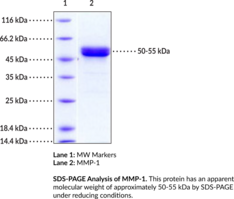Territorial Availability: Available through Bertin Technologies only in France
- Correlated keywords
- MMP1 IGF1 IGFBP-3 TNF? Mycobacterium HEK-293
- Product Overview:
Matrix metalloproteinase-1 (MMP-1) is an endopeptidase that has a major role in tissue remodeling.{61761,61762} It is composed of an N-terminal extracellular signal peptide, a prodomain containing a cysteine switch that interacts with the catalytic domain to regulate the proteolytic activity of MMP-1, a catalytic domain, and a C-terminal domain containing four hemopexin-like repeats which confer specificity for collagen.{61761} MMP-1 is ubiquitously expressed at low levels under normal physiological conditions and localizes to the extracellular space.{61762} It is primarily involved in the degradation of the extracellular matrix with type I collagen being its main substrate, but also degrades types II, III, V, IX, and X fibrillar collagens. MMP-1 also cleaves cell surface molecules such as insulin-like growth factor 1 (IGF-1) binding protein 3 (IGFBP3) and TNF-?.{61761} Knockdown of MMP1 inhibits the proliferation, migration, and invasion of colorectal cancer cells.{61763} MMP1 transgenic mice exhibit increased alveolar damage following exposure to M. tuberculosis.{61764} Polymorphisms of MMP1 are associated with several diseases, including various cancers, periodontitis, and coronary artery disease.{61762} Cayman’s MMP-1 (human, recombinant) protein can be used for enzyme activity applications. This protein consists of 461 amino acids and has a predicted N-terminus of Phe20 after signal peptide cleavage. By SDS-PAGE, under reducing conditions, the apparent molecular mass of the protein is 50-55 kDa.
Cayman Chemical’s mission is to help make research possible by supplying scientists worldwide with the basic research tools necessary for advancing human and animal health. Our utmost commitment to healthcare researchers is to offer the highest quality products with an affordable pricing policy.
Our scientists are experts in the synthesis, purification, and characterization of biochemicals ranging from small drug-like heterocycles to complex biolipids, fatty acids, and many others. We are also highly skilled in all aspects of assay and antibody development, protein expression, crystallization, and structure determination.
Over the past thirty years, Cayman developed a deep knowledge base in lipid biochemistry, including research involving the arachidonic acid cascade, inositol phosphates, and cannabinoids. This knowledge enabled the production of reagents of exceptional quality for cancer, oxidative injury, epigenetics, neuroscience, inflammation, metabolism, and many additional lines of research.
Our organic and analytical chemists specialize in the rapid development of manufacturing processes and analytical methods to carry out clinical and commercial GMP-API production. Pre-clinical drug discovery efforts are currently underway in the areas of bone restoration and repair, muscular dystrophy, oncology, and inflammation. A separate group of Ph.D.-level scientists are dedicated to offering Hit-to-Lead Discovery and Profiling Services for epigenetic targets. Our knowledgeable chemists can be contracted to perform complete sample analysis for analytes measured by the majority of our assays. We also offer a wide range of analytical services using LC-MS/MS, HPLC, GC, and many other techniques.
Accreditations
ISO/IEC 17025:2005
ISO Guide 34:2009
Cayman is a leader in the field of emerging drugs of abuse, providing high-purity Schedule I-V Controlled Substances to federally-licensed laboratories and qualified academic research institutions for forensic analyses. We are certified by ACLASS Accreditation Services with dual accreditation to ISO/IEC 17025:2005 and ISO Guide 34:2009.





